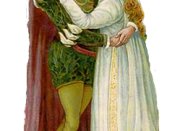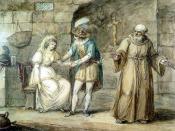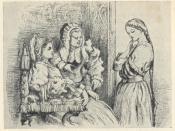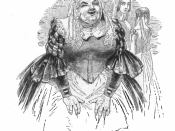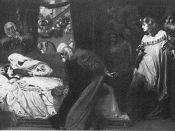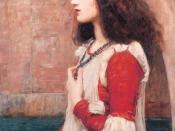In the play, Romeo and Juliet, by William Shakespeare, one of the main characters, Juliet, transforms from a young and innocent girl to a woman who can think for herself and stand on her own. First, Juliet is a young and innocent girl. Second, after she marries Romeo, she begins to become womanlier. Third, she becomes a person who is independent and can stand up for what she thinks. In brief, Juliet changes dramatically because of her love for Romeo.
Early in the play, Juliet is still a child and blissfully ignorant of the ways of the world and often turns to her Nurese and her mother for guidance and advice. In the beginning of the scene, Juliet is introduced as an attractice but callow youngster. When she is brought into the play, the Nurse says that Juliet is "not fourteen"� (I. iii. 13) but around thirteen years of age.
Juliet is a young teenager who has never thought of disobeying her parents. Juliet is an image of a youthful adolescent who is quiet, guiltless, and also obedient, a picture of beauty and politeness. Second, Juliet does not think out of her boundaries. When Juliet's mother brings up the subject on marriage and the fact that Paris seeks her as a bride, Juliet replies, "It is an honor that I dream not of"� (I. iii. 71). At this point, Juliet has not even thought about marriage, let alone becoming a bride to Paris. Like any girl, Juliet is concerned only with the events happening around her, not her future. Also, she is beginning to show a reluctant kind of feeling. Rather than just accepting the fact that she is going to become someone else's bride, she shows an act of defiance. This is observed when Juliet does not say yes to the marriage proposal. Third, Juliet shows a sign of reliance to her mother. After the Nurse and Juliet's mother praise Paris with compliments, Juliet replies, "I'll look to like, if looking liking move / But no more deep will I endart mine eye / Than your consent gives strength to make it fly"� (I. iv. 103-104). Here, Juliet shows her dependence on her mother and often looks to her mother for guidance. She depends on her mother for assistance and encouragement. Juliet is obedient to promise to bear in mind that Paris could be a possible husband to the level her mother wishes. Juliet accedes to her mother's wishes, but she will not go out of her way to fall in love with Paris. In the beginning of the play, Juliet is mostly a guiltless girl, dependent on her guardians for aid and direction.
Later in the play, Juliet begins to mature and change into a more womanly person. First, Juliet meets Romeo, her future love, in a party and they fall in love at first sight. When Romeo leaves and Juliet finds out that her love is a Montague, her family's sworn enemy, Juliet says, "My only love sprung from my only hate! / Too early seen unknown, and known too late! / Prodigious birth of love it is to me / That I must love a loathed enemy"� (I. v. 152-155). The words of Juliet express an initial changing event in Juliet's attitude. Her first meeting with Romeo propels her toward adulthood, and she seems to have matured from her childish self to a woman who can make her own decisions. This meeting ignites a loving relationship that will continue throughout the play. In addition, the meeting is the beginning of a quick maturity in Juliet's life. Second, after Juliet marries Romeo, she begins to lie to her parents. When Tybalt is slain and Juliet's mother confronts her about who murdered Tybalt, Juliet lies and says, "I will not marry yet, and when I do I swear / it shall be Romeo, whom you know I hate"� (III. v. 126-128). Juliet has just lied to her mother, the first of a series of lies told by Juliet. When Juliet was first introduced, she says she will have her mother approve of her love before she actually begins to love a person. Juliet lies by saying she has not yet married, but in reality had clandestinely been involved in a relationship that ended up in a secret marriage. Third, Juliet illustrates her true love for Romeo even when Romeo did something terribly wrong. After Juliet learns that Tybalt was slain by Romeo, the Nurse begins to curse Romeo and yells that shame should be brought down onto Romeo. Juliet immediately counters with the words, "For such a wish. He was not born to shame. / Upon his brow shame is ashamed to sit, / for "ÃÂtis a throne where honour may be crowned / Sole monarch of the universal earth. / O, what a beast was I to chide at him"� (III. ii. 90-95). Even when Romeo murdered her cousin, Juliet does not stand against her husband. Even though one of her family has been killed, Juliet still gives way to her great feelings of love for her Romeo. She is now on the same side as Romeo, standing opposite the rest of her family. Hence, Juliet is becoming more adult-like.
Towards the end of the play, Juliet is transformed from a young girl to a whole different, independent, and self assuring person entirely different from the child in the beginning of the play. First, Juliet breaks off her tie with both of her parents and even the Nurse, herself. After, Juliet is convinced to marry Paris against her wishes, her parents both criticize Juliet severely and they leave angrily. After Juliet cannot find condolence with her Nurse as well, she yells, "Ancient damnation! O most wicked fiend, / Is it more sin to wish me thus forsworn, / Or to dispraise my lord with that same tongue / which she hath praised him above compare / so many thousand times? Go, counselor. / Thou and my bosom henceforth shall be twain. / I'll to the Friar to know his remedy. / If all else fail, myself have power to die"� (III. vi. 236-242). Juliet has broken her last tie with her parents and this act of courage shows the kind of maturity that Juliet possesses. She is no longer the obedient and innocent teenage daughter of the Capulets, but a young woman, a bride and a wife to Romeo, her true love. Now, since the Nurse has been more of a mother to Juliet than her true biological mother has, this bond must have been very hard to break. The words of "go counselor"� signify the anger that she uses to defy her Nurse. Every member of Juliet's primary family has abandoned her and will accept her only if she goes against her own wishes to marry Paris. Although she is a young woman now, she is still a young person who needs an older person's support. Unable to turn to her mother, she turns to the Friar for guidance. Second, Juliet defies her parents greatly by pretending to accept the proposal to marry Paris. After receiving a solution to her problems given to her by the Friar, Juliet must pretend to listen and obey her parents. She tells her father she has been, "Where I have learned to repent the sin / Of disobedient opposition / To you and your behests, and am enjoined / By Holy Lawrence to fall prostrate here / To beg your pardon. Pardon, I beseech you. / Henceforward I am ever ruled by you"� (IV. ii. 18-23). Juliet has just lied to her parent sand will later fake her death. Juliet's duplicity outwits everybody including her parents and even the Nurse, herself. Third, Juliet shows enough emotional strength to commit suicide. As Romeo lies dead as the result of a problem in the Friar's plan, Juliet feels she can live no longer; she says, "Yea noise/ Then I'll be brief. O, happy dagger, / This is thy sheath. There rust, and let me die"� (V. iii. 174-174). After saying these last words, Juliet commits suicide and stabs herself through her heart. This kind of courage is probably the most important thing Juliet has done in her short life. This act done by Juliet shows her dignity and strength of her character. Rather than marry Paris, she fakes her death, which leads to her own suicide. Even though the Friar warned Juliet to leave the monument, Juliet follows through with her promise to be with Romeo in death. Hence, Juliet has become a new woman truly changed by her love for Romeo.
To conclude, Juliet revolutionizes from an infantile and submissive child to a responsible woman who can stand up for herself and make her own decisions. In the beginning, Juliet is a youthful and dutiful girl who relies on her mother and Nurse. Then, after she marries Romeo, she begins to transform because of her new love. Finally, she becomes an entirely different person who can rise up to her beliefs and decide for her what is right and wrong. Juliet's entire life is changed by the fact she loved Romeo. Her relationship causes her to defy and to lie to her parents, which eventually leads to her downfall.
